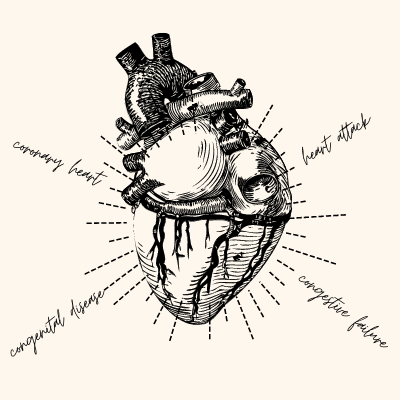Heart disease is one of the leading causes of death in the United States. February is known as Heart Health month we would like to discuss now. It’s showing more and more that CBD and heart health could play hand in hand together. Education is the primary way we will change the tide, as heart disease is the number one killer of adults. More and more benefits of CBD and heart health are being brought to light. From research to customer testimonials, using CBD for heart health seems like it should be a first starting point.
CBD and Its Benefits For A Healthy Heart:
The British Journal of Clinical Pharmacology journal provides accumulating evidence research suggests that CBD is beneficial in the cardiovascular system. (Stanley, Christopher P et al., 2012). Based on various findings from several related animal-trialed studies (Stanley, Christopher P et al., 2012). This research has proven CBD’s direct influence on isolated arteries. Its ability protects against the vascular damage caused by a high glucose environment. Several of these studies support CBD’s ability to reduce the risk of related heart conditions.
Similarly, This evidence also tells us of the “potential therapeutic uses of cannabinoids other than CBD in cardiovascular diseases. Including cardioprotection, stroke, arrhythmias, and atherosclerosis” (Stanley, Christopher P et al., 2012). A reason why CBD is not the only cannabinoid featured in our full spectrum products? 😉
Because of research was done by Christopher Stanley, William Hind, and Saoirse O’Sullivan. It has been determined that a twice-daily CBD serving not only helps protect against diabetes but is a great way to combat stress. These scientists deduce that, in the body, CBD “reduces the cardiovascular response to models of stress. Inhibited by a 5HT1A receptor antagonist” (Stanley, Christopher P et al., 2012).
CBD’s anti-inflammatory and anti-oxidative properties may reduce risk factors that can lead to heart diseases. Such as high blood pressure or a history of stroke. In one animal study, CBD increased test subjects’ blood flow, reducing stroke risk (Stanley, Christopher P et al., 2012).
CBD is a natural compound found in the cannabis plant that has been gaining popularity in recent years for its potential health benefits. One potential benefit that has been gaining attention is its ability to help with heart palpitations.
Research has shown that CBD may help reduce the frequency and intensity of heart palpitations and the risk of other cardiac conditions. In this blog, we’ll explore the evidence for CBD’s potential heart-health benefits and discuss how it might help those experiencing heart palpitations.
Myocarditis:
In addition, CBD is known for its anti-inflammatory and anti-fibrotic effects.
Similarly, another CBD study was conducted. The experiment looked at the effects on myocarditis patients when given CBD. Above all, the results of the said study determined that CBD treatment significantly improved myocardial function. Myocarditis, “a major cause of heart failure and sudden cardiac death in young adults and adolescents,” is inflammation of the heart muscle (Lee, Wen-Shin, et al., 2016). This study, provided by Molecular Medicine, demonstrates CBD’s “tremendous therapeutic potential in the therapy of myocarditis with different etiologies and various autoimmune disorders” (Lee, Wen-Shin, et al., 2016). Theorists also suggest that CBD could be a promising treatment to aid patient health during organ transplantation.
In November of 2021, the CDC released that they were “actively monitoring reports of myocarditis and pericarditis after [the] COVID-19 vaccination” (Centers for Disease Control and Prevention [CDC], 2021). In response to Pfizer-BioNTech and Moderna vaccinations, cases of myocarditis and pericarditis have risen–generally within one week after a person’s second dose. If you or a loved one was recently vaccinated, taking a regular CBD supplement could help combat any possible side effects of your COVID vaccine.
Real BHO Customers On Their Heart Health
You do not have to take our word for it. Take the word of our real Genesis Blend customers who swear by our full spectrum product to keep their hearts healthy and happy. Several of our Bluegrass Hemp Oil customers have seen firsthand the benefits of using CBD to promote a healthy heart. Here is one customer review demonstrating how incorporating our Genesis Blend Hemp Extract could improve things: Robert was on prescription medication for high blood pressure of 180/135 approximately. For over a year, he took multiple medications and saw no benefits.
Robert states; Bill Polyniak (owner and founder of Bluegrass Hemp Oil) gave me some CBD oil to try, and my blood pressure went down almost immediately. By taking continued servings, morning and night, when I went back to the doctor the next week, my BP was down to 120/60. Taking CBD oil daily, and my blood pressure has remained steady and lower. I was able to go back to work (construction) and noticed I was not taking ibuprofen for my back pain like I was (3 pills three times a day).
Shop National Heart Health Month
This National Heart Health Month, take some time to think about your heart health and how you can proactively fight against related heart issues. Shop our online store, or visit us at our Lexington or Midway locations to purchase your own be of our Genesis Blend Hemp Extract to stay healthy this year and in years to come! Need some more information about the best Genesis Blend bottle for you? Our CBD experts would love to help! Give us a call or find us on our contact page to take the first step of your CBD journey.
Stanley, Christopher P et al. “Is the cardiovascular system a therapeutic target for cannabidiol?.” British journal of clinical pharmacology vol. 75,2 (2013): 313-22. doi:10.1111/j.1365-2125.2012.04351.x
Lee, Wen-Shin, et al. “Cannabidiol Limits T Cell-Mediated Chronic Autoimmune Myocarditis: Implications to Autoimmune Disorders and Organ Transplantation.” Molecular medicine (Cambridge, Mass.) vol. 22 (2016): 136–146. doi:10.2119/molmed.2016.00007

